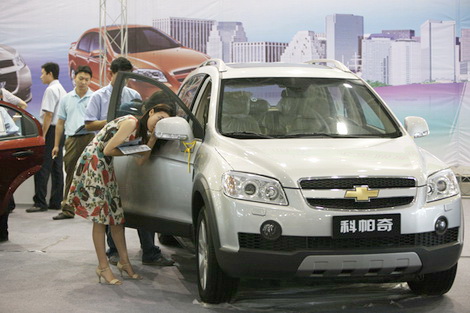For today's SUV buyers, small is good
Updated: 2011-08-29 09:14
By Li Fangfang (China Daily)
|
|||||||||
|
 Customers examine a Chevrolet Captiva in an automobile market in Beijing. China sold 111,514 SUVs in July, a 15.3 percent increase over last year, according to the China Passenger Car Association.[Photo/China Daily]
|
Niche market is opening for medium-priced urban models
BEIJING - Yang Liu, an 28-year-old advertising designer in Xi'an, Shaanxi province, recently found that the options were limited in choosing a car that fits with her life in the city.
"I prefer a sport utility vehicle (SUV), which has a sporty look, full of energy, perfect for a girl like me, who is in innovative profession. But those tall and bulky SUVs seem too big for me to handle," said Yang, who at 164 centimeters tall could be described as slight.
"And the price of the models I prefer - more than 250,000 yuan ($45,166) - is too expensive for me," she added.
The young, fashionable woman, who has a modern and outgoing lifestyle, told China Daily that if "there were more choices for a smaller and cheaper SUV, it would really help me open my wallet right away".
Huang Qiang, an English teacher in Chongqing, agrees.
"A big SUV, easy to find locally, will pose problems with parking in the crowded downtown area, and it will use more fuel. But a sedan with a low-built chassis isn't suited to the suburban and even mountain driving I do during the weekends and holidays," said 27-year-old Huang. "I like urban SUV models."
In the past four years, SUVs have become the most popular type of car in China's booming automobile market and have the fastest sales growth.
According to the China Association of Automobile Manufacturers, 1.33 million SUVs were sold in the country in 2010, a year-on-year increase of 101.27 percent, almost four times the sales growth of sedans.
In the first seven months of this year, Chinese drivers bought 798,405 SUVs, up 29.1 percent from the same period of last year, according to the China Passenger Car Association.
In July alone, 111,514 SUVs were sold in China, a 15.3 percent increase over last year, and maintaining the highest growth rate among all segments as China's automobile market slowed down, the association said.
"I think the smaller SUV, for the medium-end market, that is made by foreign joint ventures in China has the greatest potential in the coming years," said Lu Mingze, automobile market research director for Sinotrust International Information & Consulting (Beijing) Co, Ltd.
Before 2003, Chinese consumers thought of SUVs as off-road, bulky gas-guzzlers, like the Beijing Jeep Grand Cherokee. The Chinese even thought of the Jeep brand as a synonym for SUV.
Between 2003 and 2005, the concept of the SUV expanded in Chinese consumers' minds, as foreign joint ventures introduced more SUV models. But the high prices and large engine capacity kept potential buyers out of the showrooms.
After 2005, as SUVs caught on with car buyers in the big cities, especially as the top choice for a second car, automakers began offering SUVs with a smaller engine capacity made for city driving.
"The downsizing of the SUV will continue, as demand increases," said Lu. "But, currently, there are few small SUV models in the medium-end SUV market, which is dominated by joint venture brands."
According to a recent Sinotrust survey, small SUVs have struck a chord with Chinese consumers, with 62.4 percent of the 974 respondents saying that they would like to buy a small SUV and 12.4 percent saying they intend to buy a small SUV, compared with only 1.2 percent saying they are not likely to buy one.
Lu predicted that the demand for small SUVs, with a wheelbase of 2,500 to 2,600 millimeters, will reach 612,278 units this year.
"And we think the models priced between 80,000 yuan and 150,000 yuan have bigger potential," Lu said.
The segment is now dominated by homegrown branded models, such as Great Wall Hover, Hawtai Santafe and Chery Tiggo.
Lu said that foreign joint ventures should grab more market share in the segment with new products.
Statistics from China Passenger Car Association show that in 2010, SUVs priced at 80,000 yuan to 150,000 yuan held a 34.8 percent market share, and those priced at 150,000 to 300,000 yuan held 48 percent.
The high-end SUVs priced at more than 300,000 yuan had a 5.2 percent market share, and the homegrown brand budget SUVs costing less than 80,000 yuan held 12 percent of the SUV market.
Sinotrust forecast that the 80,000 yuan to 150,000 yuan segment will capture more market share than the 150,000 to 300,000 yuan range, giving it 36.1 percent of market share by the end of this year, with total sales of 559,000 units.
The demand for the 80,000 yuan to 150,000 yuan SUVs will almost double to 1.08 million units by the end of 2015, Lu said.










